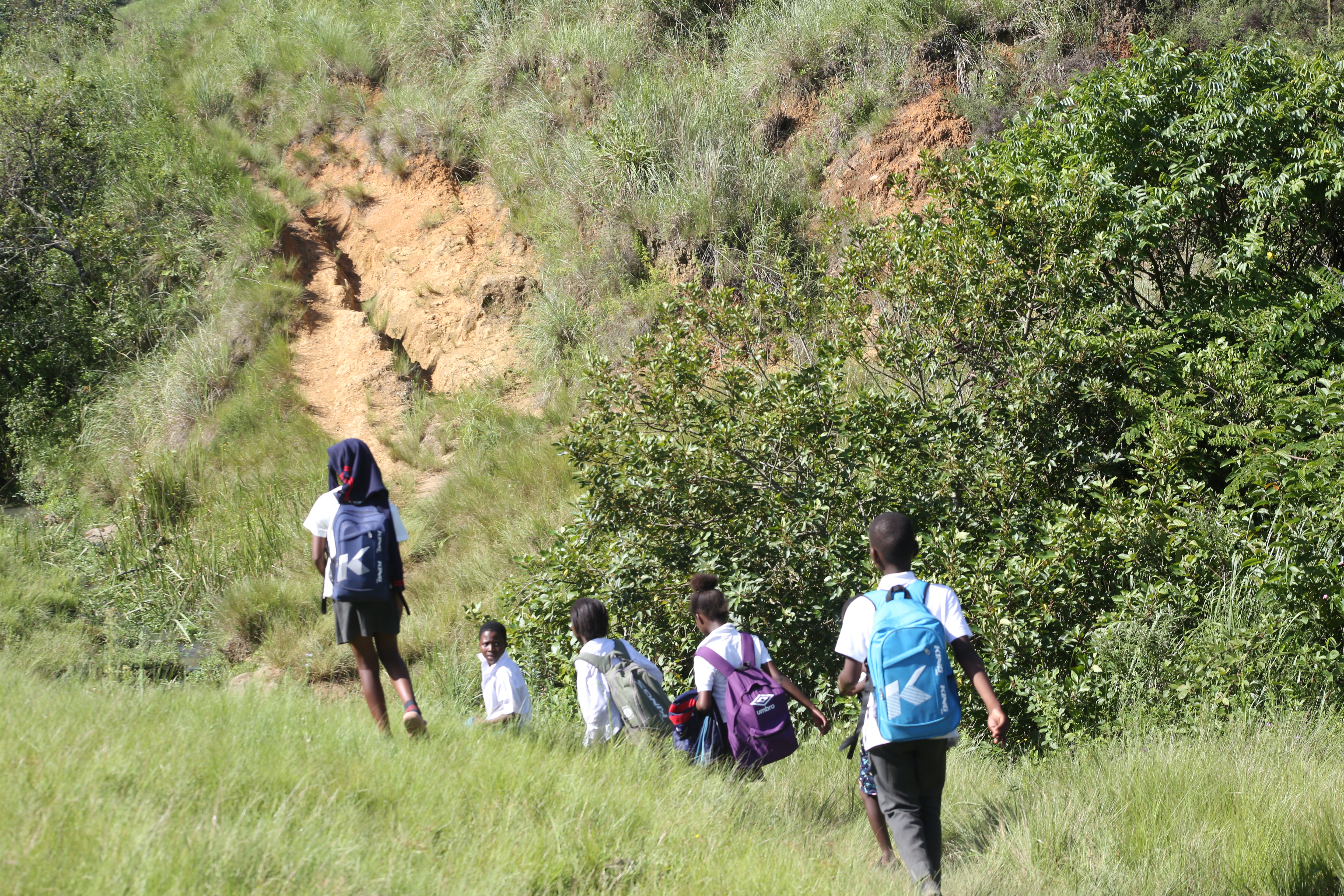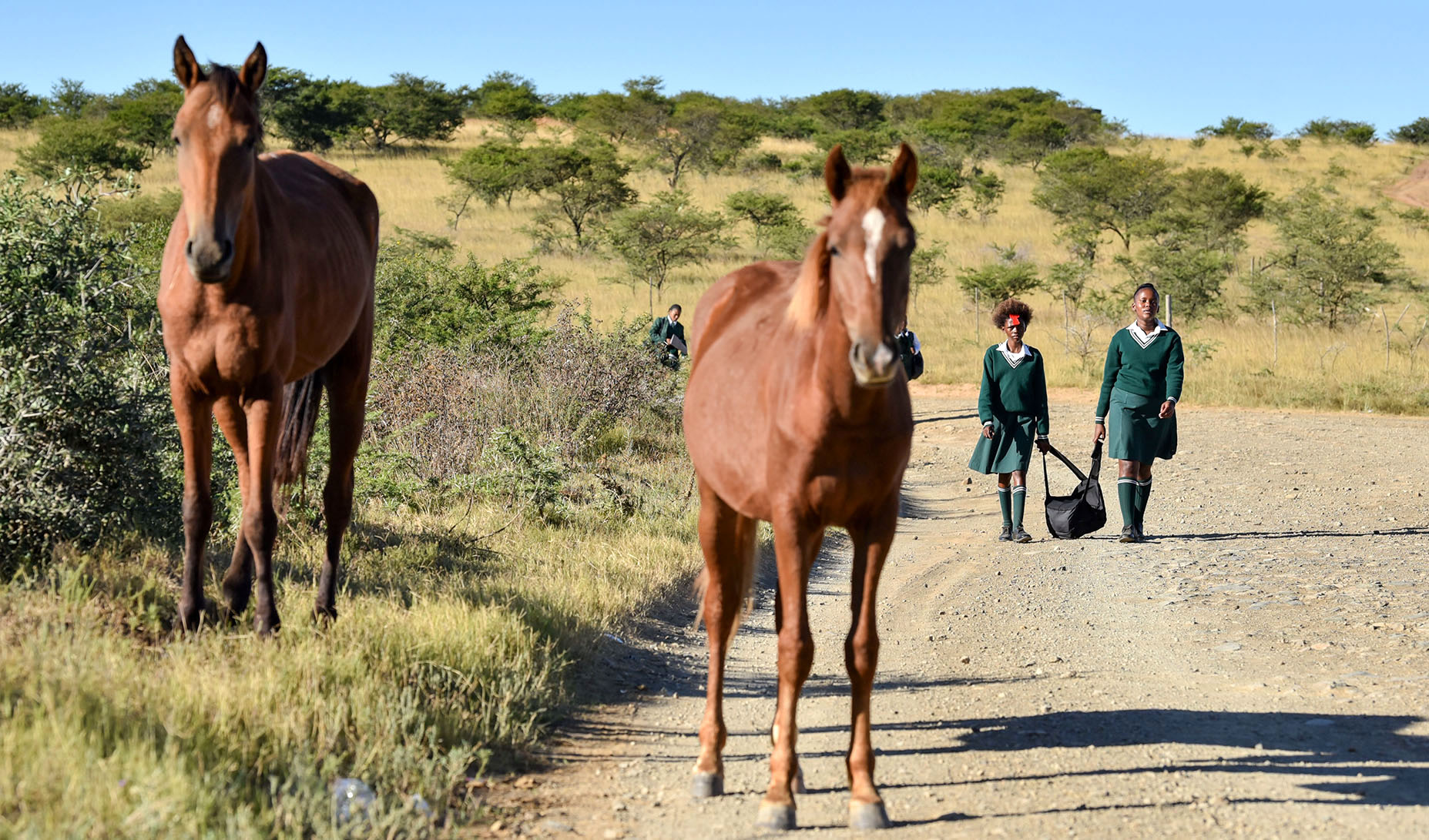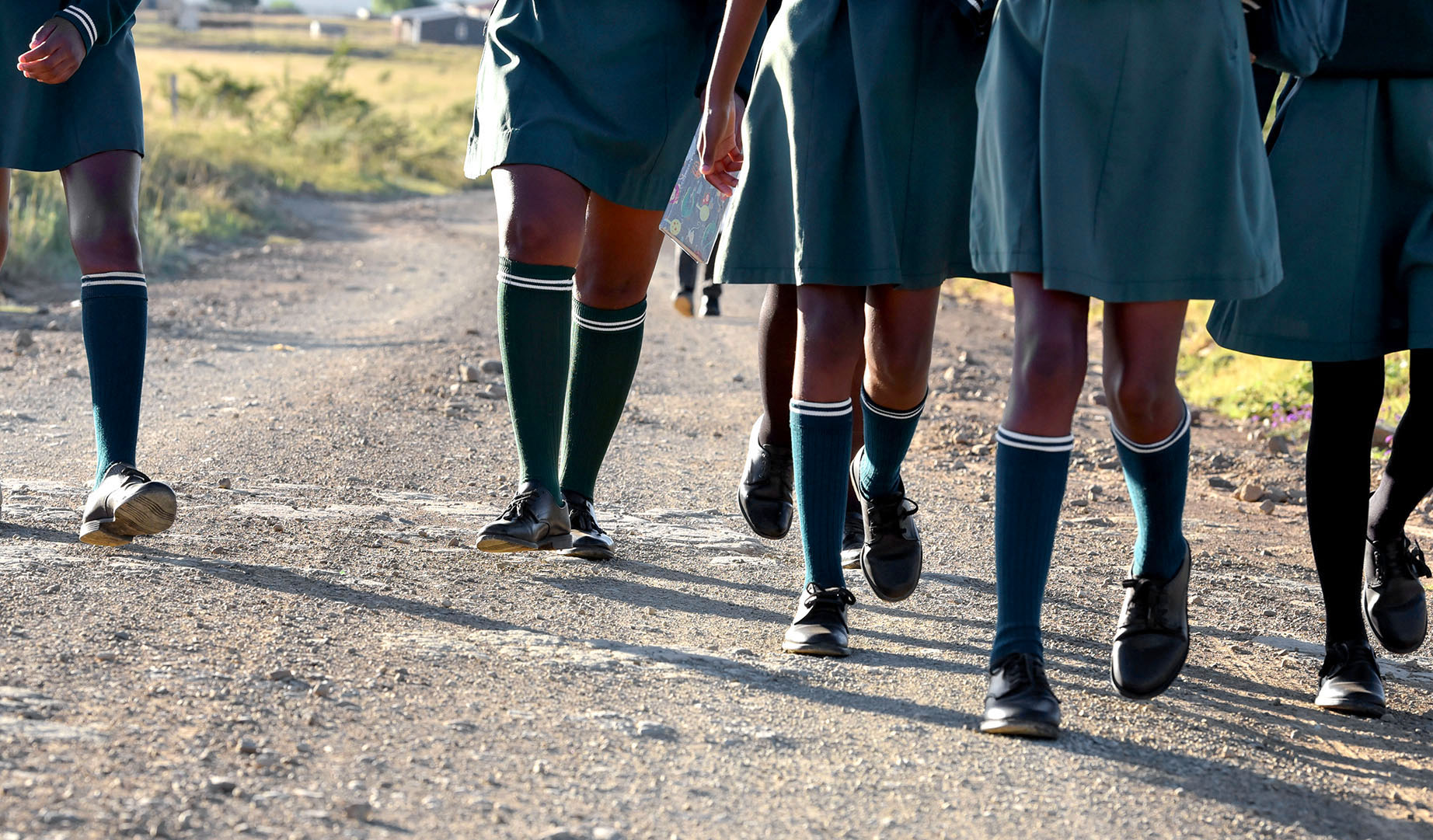The Eastern Cape Department of Transport has admitted in papers before the Eastern Cape High Court in Makhanda that while thousands more learners qualify for scholar transport, the provincial government cannot afford to provide them with the service.
In an affidavit before the court, the acting head of the department, Andile Fani, said they were “urgently reviewing” the scholar transport policy as it was practically unsustainable. He said they could change the distance requirement in the policy. Currently, children living further than 5km from their school qualify for scholar transport.
 Members of the South African Human Rights Commission walk to school with pupils who do not have access to scholar transport, on 6 March 2024. The walk started in Mbizana village, near Middledrift in the Eastern Cape, and took them to Ntabenkonyana Secondary School, nearly 10km away. (Photo: Deon Ferreira)
Members of the South African Human Rights Commission walk to school with pupils who do not have access to scholar transport, on 6 March 2024. The walk started in Mbizana village, near Middledrift in the Eastern Cape, and took them to Ntabenkonyana Secondary School, nearly 10km away. (Photo: Deon Ferreira)
He said the department had projected a shortfall of R449-million in the 2024/2025 financial year, with scholar transport costing R1-billion. A total of 103,000 children in the province benefited from scholar transport and applications for another 34,000 were pending.
The department was taken to court by the Khula Community Development Project (KCDP) and several schools. While an urgent court order was obtained earlier this year to secure scholar transport for hundreds of children, the KCDP’s Petros Majola said they wanted an order declaring that the department’s failure to provide scholar transport for all those in the province who needed it was unconstitutional.
The KCDP asked that the 34,000 outstanding applications for scholar transport be finalised and that the court order the Eastern Cape Department of Education to design “catch-up” plans for learners who missed school because of transport problems.
The KCDP also asked the court for a supervisory interdict to order government officials to provide monthly reports to a judge on their progress in providing transport to learners.
Constitutional obligation
Counsel for the KCDP and the schools, Emma Webber and Nicola Soekoe, argued that the Eastern Cape government was violating the constitutional right to education of thousands of schoolchildren.
The South African Human Rights Commission (SAHRC), represented by advocate Sarah Sephton, was admitted to the case as a friend of the court.
Read more: Through thick bush, up hills and across rivers – Eastern Cape learners’ long trek to school
While the Department of Transport argued that it could not afford to provide scholar transport for all, Webber said: “A failure by the state to budget cannot justify a consequent failure to comply with a constitutional obligation due to a lack of funds.
 Ntlozelo Junior Secondary School learners walk home in Bizana, Eastern Cape on 31 January 2024. (Photo: Hoseya Jubase)
Ntlozelo Junior Secondary School learners walk home in Bizana, Eastern Cape on 31 January 2024. (Photo: Hoseya Jubase)
“The denial of scholar transport impacts affected learners’ right to basic education, as well as a host of other rights including their right to equality, dignity, freedom, bodily security and family life.
“It cannot be disputed that the Eastern Cape government has violated the rights of tens of thousands of learners.”
A supervisory interdict was necessary, she said, to hold the provincial government to account and make sure that applications were processed and actioned.
Describing the plight of those denied scholar transport, Majola said learners, including small children in Grade 1, were forced to walk long distances, often in hazardous conditions.
“The lengthy distances cause learners great fatigue. This severely hampers their ability to actively participate in classes. As a result, their education suffers.
“Some parents opt to pay for private transport or find their children alternative accommodation near their schools. While this ensures their children do not have to spend hours a day walking and have more time for their education, it imposes an additional financial strain on families that is often too burdensome to bear,” he said.
“Learners who have found alternative accommodation closer to their school have had to leave their families behind, negatively affecting their experience of their family life and depriving them of the support system that their immediate family provides them with.”
‘Financially impossible’
Fani said in papers before the court the department did not have enough money to provide transport to all scholars in the province.
“The reality is that it will simply not be financially possible to continue to provide and meet the increasing demand for scholar transport throughout the Eastern Cape in accordance with the existing model,” he said, adding that the programme was being manipulated by school principals who populated their schools with children who lived far away to avoid closure.
 Learners from Ntabenkonyana Senior Secondary School in Xesi, Eastern Cape, on the last stretch of their 10km walk. (Photo: Deon Ferreira)
Learners from Ntabenkonyana Senior Secondary School in Xesi, Eastern Cape, on the last stretch of their 10km walk. (Photo: Deon Ferreira)
The department was not disregarding or ignoring the consequences of withdrawing scholar transport and should also get credit for providing transport services costing R1-billion to learners, he said.
The scholar transport programme in the Eastern Cape is the biggest in South Africa.
In response to the schools and the KCDP, Richard Buchanan SC argued that the Eastern Cape departments of transport and education should be given a chance “to get their house in order”. He said the relief sought by the schools and the KCDP did not provide for “a period of reflection or adaptation of the existing policy”.
He said neither the Department of Transport nor the Department of Education was unable or unwilling to provide scholar transport and both were acutely aware of their constitutional obligations.
The court reserved judgment.
Provincial recession
Unrelated to the court case, Dr Malcolm Figg, a DA member of the Eastern Cape Legislature, said on Thursday that the province’s financial challenges were becoming more critical.
Earlier this year, the Eastern Cape became the first province in South Africa to go into an economic recession. The unemployment rate in the province, excluding discouraged job seekers, is 41%.
Read more: It’s official — Eastern Cape economy is in the throes of a recession
“The province is battling with an ever-increasing wage bill, a lack of investment in infrastructure, a lack of self-revenue generation and provincial entities draining the fiscus with no real return. This has resulted in significant financial shortfalls that have repeatedly forced the Provincial Treasury to dip into the province’s reserves,” said Figg.
“With financial shortfalls deepening and vital services hanging in the balance, the people of the Eastern Cape are bearing the brunt of unsustainable spending, collapsing infrastructure and missed opportunities for growth.” DM




 Learners from Ntabenkonyana Senior Secondary School in Xesi, Eastern Cape, on the last stretch of their 10km walk to school. (Photo: Deon Ferreira)
Learners from Ntabenkonyana Senior Secondary School in Xesi, Eastern Cape, on the last stretch of their 10km walk to school. (Photo: Deon Ferreira) 